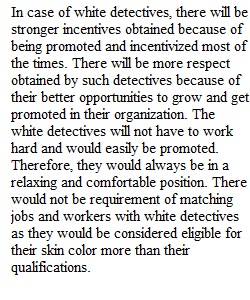


Q The intelligence division (hereafter “ the division ”) of the New York City Police Department (NYPD) covers terrorism and other major crimes. In the fall of 2017, three of the division’ s black detectives filed a federal lawsuit alleging racial discrimination in promotions. Promotions in the division come with significant increases in pay and prestige. A central issue in the lawsuit is the lack of a transparent and objective rules-based promotion policy that minimizes the discretion that can lead to discriminatory promotion decisions. A 2016 ruling by the federal Equal Employment Opportunity Commission (EEOC) referred to the division’ s promotion process as “ wholly subjective and secret ” and claimed that it promotes white detectives more rapidly than similarly qualified black detectives. Specifically, the EEOC used seven years of promotions data to show that white detectives spend a couple of years less time than blacks in the division’ s lowest level before being promoted and that experience or other worker characteristics cannot explain this racial difference. Supervisor discretion plays a considerable role in detectives’ promotions. Supervisors pass promotion recommendations up the chain of command, and then promotion decisions are announced with minimal explanation and justification. This lack of a formal promotions policy for detectives is in contrast to the policies for officers seeking to become sergeants, lieutenants, or captains, all of which heavily depend on exam performances. Job assignments within the division’ s lower ranks also contribute to subsequent racial disparities in promotions. Black detectives, for example, tend to be concentrated in the “ rap unit ”, which involves going to hip-hop concerts to provide security. Such low-profile assignments limit opportunities for advancement. Questions 1. If the allegations against the NYPD are true, what are the implications (both for creating strong worker incentives and for matching workers and jobs in the best possible way)? Discuss these for white detectives and black detectives separately. 2. What are the advantages and disadvantages of going to an entirely rules-based promotion system that removes discretion from the hands of supervisors? 3. As a senior member of the NYPD, your job is to work with the legal team to develop a strategy for countering the claims in the lawsuit. What are the arguments you might make? 4. Suppose that, fearing future racial discrimination lawsuits, some supervisors start inflating the performance ratings of low-ranked black detectives. However, this creates a situation in which black detectives have stronger records (on paper) than white detectives who are (in reality) equally good or perhaps even better. If the black detectives are then passed over for promotion, their case for a lawsuit becomes even stronger. What ideas do you have to manage this problem? 5. Could changes to the compensation system solve or mitigate the NYPD’ s core problem? Explain.
View Related Questions